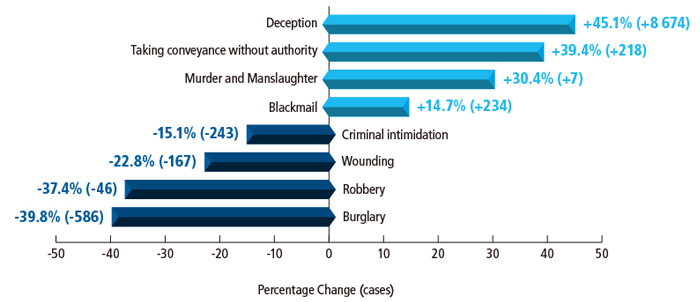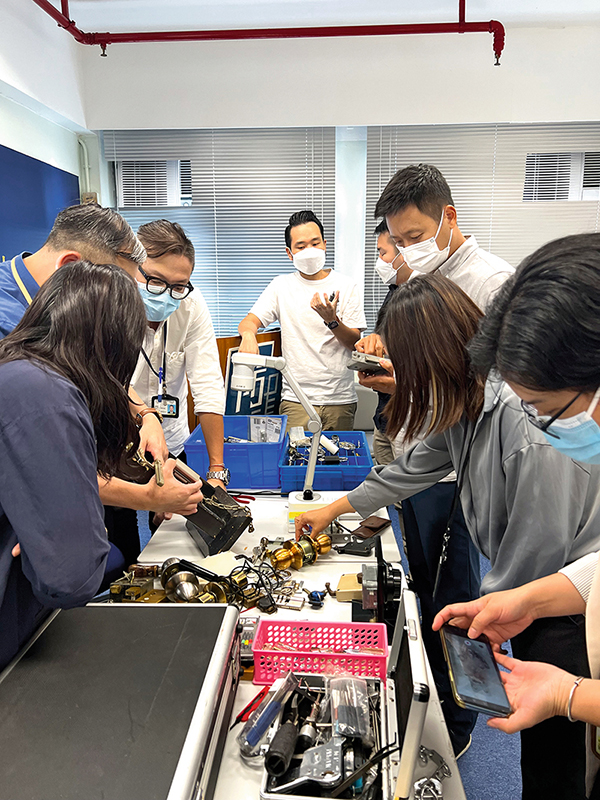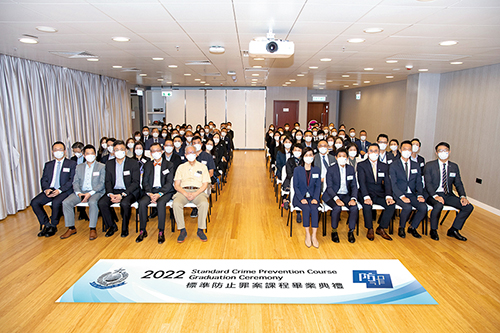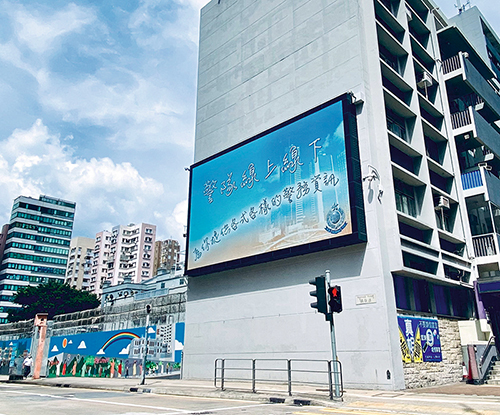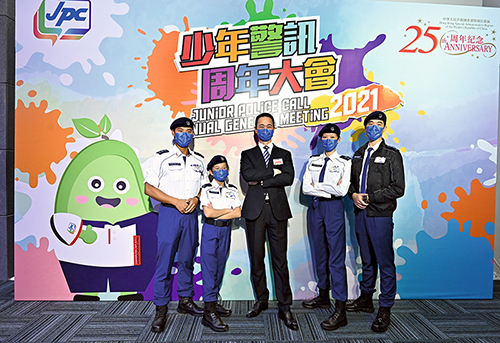
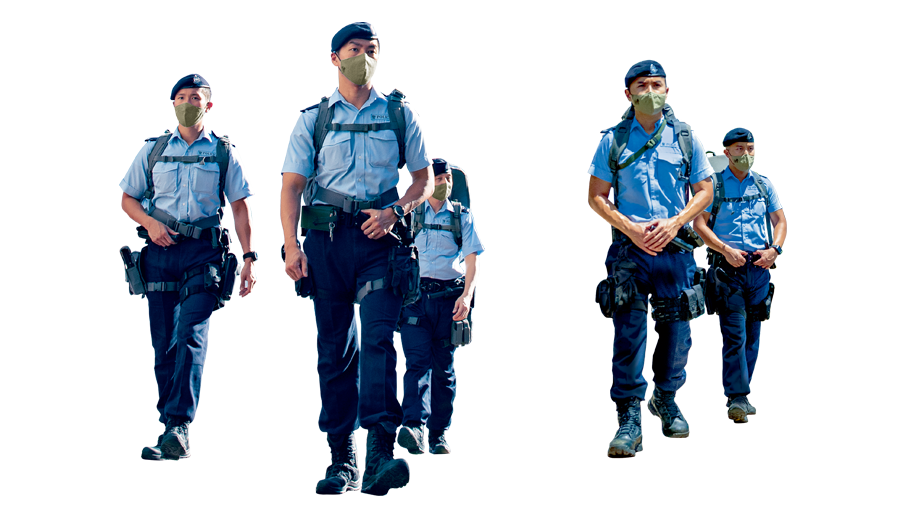
The number of crimes reported to the Police in 2022 was 70,048, a rise of 5,620 cases (up 8.7%) compared with 2021 (64,428 cases). Violent crimes decreased by 757 cases (down 7.9%) from 9,587 to 8,830. Deception (8,674 more cases, up 45.1%) was the major factor for the overall increase.
For every 100,000 people, 954 cases were reported, of which 120 were classified as violent crime, compared with 869 and 129 cases respectively in 2021. Detection rates for both overall and violent crimes dropped slightly by, respectively, 3.3 and 1.1 percentage points. The year 2022 registered the lowest figures for both robberies and burglaries since these statistics started to be kept in 1969. Burglaries also saw the highest detection rate, of 42.6%, in the past 46 years.
The Force has been taking a multi-pronged approach to combat deception, such as by strengthening intelligence-led enforcement action and preventive publicity and education. An e-Crime Processing and Analysis Hub was formed in 2022 to work with the Anti-Deception Coordination Centre so as to handle deception cases more effectively.
Organised Crime and Triads
The Organized Crime and Triad Bureau combats organised and serious crime and triad activities, including firearms and smuggling activities, through proactive, intelligence-led operations and investigations.
Between May and September, the Bureau conducted a tripartite operation, THUNDERBOLT 2022, with Guangdong and Macao Police, resulting in the arrest of 3,581 persons and the seizure of crime proceeds worth more than $380 million.
In November and December, the Bureau executed Operations CROWBEAK and WINDSHIELD and co-ordinated enforcement action across the Force against illegal bookmaking during FIFA World Cup Qatar 2022, leading to the arrest of 1,104 persons and the seizure of $10 million in cash and betting records worth more than $560 million.
Criminal Intelligence
As the intelligence pivot of the Force, the Criminal Intelligence Bureau manages the Force's intelligence system and provides intelligence support for major operations and serious crime investigations. To foster intelligence-led policing across the Force, the Bureau strengthens the intelligence network, upgrades computer systems that analyse intelligence, facilitates the effective flow of intelligence and provides professional training. It also targets triads and sophisticated crime syndicates, and liaises closely with designated Mainland, Macao and overseas law enforcement intelligence agencies in the fight against transnational and cross-boundary crimes.
Commercial Crime
The Commercial Crime Bureau investigates complex commercial crimes and co-operates proactively with stakeholders to conduct intelligence-led operations against syndicated commercial fraudsters. During the year, the Bureau carried out many operations and arrested 178 persons for allegedly defrauding the Government through the 2022 Consumption Voucher Scheme and the Special 100% Loan Guarantee measure. In addition, it detected a number of alarming scams being perpetuated on social media and crushed two operating centres controlled by fraud syndicates in the territory.
The Anti-Deception Coordination Centre plays a pivotal role in disrupting deception and raising public awareness of various scams. As of December 31, 2022, the Anti-Scam Helpline 18222 had received 144,341 public enquiry calls and helped intercept $11.22 billion of crime proceeds in 3,732 fraud cases since its launch in July 2017.
During the year, the Centre organised Anti-Deception Month and Anti-Deception Season on the themes 'Scammers Steal, Stay Alert' and 'Billions Swindled by Scammers', using five characters acting as fraudsters to alert the public to the most prevalent scams. In November, a publicity campaign, 'Anti-scam Test Across the Territory', was launched to raise public awareness and vigilance via an innovative approach.

The Anti-Deception Coordination Centre launched a territory-wide publicity campaign, 'Anti-scam Test Across the Territory', in November.
On another front, the Centre actively enlists stakeholders' support to disseminate messages against fraud. For example, the Transport Department broadcasts such information in 17 government tunnels, cinemas show anti-deception videos and telecommunications providers send anti-scam notices to users via SMS and social media platforms.
In September, the Force signed a Memorandum of Understanding (MoU) with the Accounting and Financial Reporting Council to strengthen their co-operation framework for case referrals, joint investigations, capacity building and information exchange. The Bureau, being the designated contact point with the council, will forge close collaboration to combat commercial crimes and other illicit activities in financial reporting and audit matters.
The Fraud and Money Laundering Intelligence Taskforce, established jointly with the Hong Kong Monetary Authority, Hong Kong Association of Banks and local financial institutions, draws on the expertise and capabilities of the banking industry to fight fraud and money laundering. In addition, the Taskforce acts as a publicity co-ordinator between the Police and the banking sector to better synergise collaborative efforts on anti-deception and anti-money laundering publicity. In November, it hosted a train-the-trainer workshop for 150 participants from 28 local banks, who shared experiences in deception intervention, the detection of bogus identities and mule account network analysis.
E-Crime Processing and Analysis
An e-Crime Processing and Analysis Hub was established in September. The e-Hub is a one-stop platform serving three functions, namely, receipt of reports, case analysis and referral. It shortens the processing time of e-reports about technology crime and deception and, in collaboration with the Anti-Deception Coordination Centre, enhances the effectiveness of case handling.
Cyber Security and Technology Crime
The Cyber Security and Technology Crime Bureau (CSTCB) combats technology crime and maintains the security of Hong Kong's cyberspace by partnering with the community as well as local and overseas stakeholders.
The Bureau leads international collaboration in cyber security. In July, it organised the 2nd Virtual Technology Crime Investigation Workshop under the theme 'The Next Generation Policing: Emerging Technologies and Changing Cyber Threats', which attracted more than 540 cybercrime investigators and digital forensics experts from 84 INTERPOL member jurisdictions. The workshop provided a platform for law enforcement agencies, private-sector experts and academic researchers to share profound insights and expertise in emerging cyber threats, to learn from one another and to face new challenges together.

The CSTCB published three storybooks under the CyberSec Series in September to teach children how to deal with cyber bullying, identify online dating traps and be alert to information security.
In September, the Bureau launched the Scameter, a one-stop scam and pitfall search engine for public use on the CyberDefender website, a project supported by the Bureau. By year's end, more than 15% of the public's search targets had been deemed unscrupulous, which pre-empted possible preying on transactions online by con artists. The Bureau also conducted intelligence-led operations against e-shopping fraud, online investment fraud, romance scams and compensated dating scams, detecting 476 cases involving an aggregate loss of $35.8 million and 35 arrests.
To effectively curb the surge in technology crime, the Bureau introduced 'Project Crimes Of Hi-tech Elements Revamp and Enhancement (COHERE)' to establish dedicated technology crime investigation teams in all five land regions. Since January, Regional Technology Crime Units and District Technology Crime Squads in New Territories South and Kowloon East Regions have been gradually forming and coming into operation, while the remaining three regions are anticipated to implement the same by the end of 2024.
In terms of public education, the Bureau worked with 61 institutions to organise Cyber Security Expo 2022 in September, which provided wide-ranging content about information technology and cyber security to educate the public and improve teenagers' digital literacy. In December, the Bureau held the second Cyber Attack and Defence Elite Training programme, presented in two series. The Youth series was the first large cyber security campaign in the Guangdong-Hong Kong-Macao Greater Bay Area, while the Professional series provided the first hands-on training opportunities with international security operations centres.

The CSTCB hosted the Cyber Security Expo 2022 at the Hong Kong Science Park to promote understanding and awareness of cyber security.
Narcotics
The Narcotics Bureau combats drug traffickers and the flow of dangerous drugs into Hong Kong through a multi-agency and community-based approach, and promotes public awareness of drug abuse by partnering with local and overseas law enforcement agencies and community stakeholders.
Intelligence-led operations carried out in the year resulted in the arrest of 140 persons and the seizure of 3.5 tonnes of illicit drugs. These operations included the detection of the largest cannabis buds trafficking attempt to date, with 905kg of cannabis buds seized; and the largest trafficking case of methamphetamine in a decade, with 334.65kg of methamphetamine and 150 litres of liquid methamphetamine seized.
The Leadership Institute on Narcotics (L.I.O.N.), established in 2021, recruits 100 secondary and university students each year as mentees to design and implement anti-drug activities under the guidance of mentors to foster their sense of social responsibility and nurture them into outstanding young anti-drug leaders, with a view to promoting a drug-free culture in schools and the community, as well as helping their peers develop positive values and broaden horizons.
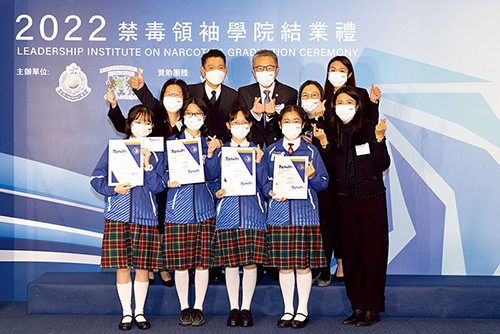
The L.I.O.N. Graduation Ceremony cum High Table Dinner was held in December where the Commissioner of Police, Mr Siu Chak-yee, presented awards to outstanding graduates.
The Bureau held the Anti-Drugs Campaign between September and November by deploying a promotional truck and organising talks about the harmful effects of drug abuse. To better appeal to youths and the public, the Bureau introduced a new anti-drug mascot called Mai Jai ('咪仔'), along with a number of interactive activities including three-dimensional hologram clips depicting the harmful effects of drugs on different organs with the adoption of the Stereoscopic 3D imaging technology, and an interactive Instagram filter game 'Let's run! Mai Jai!'. An anti-drug exhibition, Love Our Life – LOL Party, was held at the West Kowloon Cultural District. More than 3,300 exhibition visitors received the message of maintaining positive values, experiencing positivity by combatting drugs and cherishing their lives. Overall, the campaign disseminated anti-drug messages to more than 9,000 residents.

A member of the public viewed a hologram clip to visualise the harmful effects on body organs of cannabis, one of the most common drugs in Hong Kong.

The Narcotics Bureau held a large-scale anti-drug exhibition, Love Our Life – LOL Party, on November 12 and 13 to disseminate the message of 'Drugs? Never!' with the introduction of its new mascot Mai Jai.
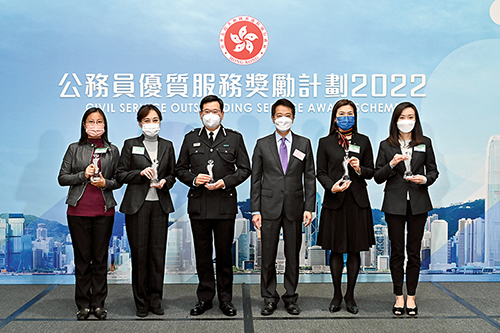
The Narcotics Bureau's Anti-Drugs Campaign won the Meritorious Award in Excellence in Team Collaboration (General Service) under the Civil Service Outstanding Service Award Scheme 2022.
Financial Intelligence and Investigation
The Financial Intelligence and Investigation Bureau (FIIB), comprising the Financial Investigation Division (FID), the Joint Financial Intelligence Unit (JFIU) and the Headquarters (HQ), seeks to strengthen the Force's anti-money laundering and counter-financing of terrorism (AML/CFT) capabilities in the face of an increasing volume and complexity of financial intelligence and investigations.
The FID conducts financial investigations and pursues asset recovery. In 2022, the efforts of the FID and other investigation units resulted in 97 convictions in court for money laundering, a total of $351 million restrained and $149 million confiscated. The JFIU deters money laundering and terrorist financing by fostering co-operation with local and international agencies to exchange financial intelligence. In 2022, it processed and analysed more than 68,000 suspicious transaction reports. The HQ works closely with other AML/CFT stakeholders on policy and legislative matters, strategic analysis, and citywide risk assessment and training. It published the 2nd Hong Kong Money Laundering and Terrorist Financing Risk Assessment Report in July to provide updates on money laundering and terrorist financing risks.
In addition to proactive enforcement, the FIIB educates the public through regular AML publicity campaigns, stakeholder and public engagement, and promotional videos.
In October, a voluntary team of serving officers formed the Money Laundering Expert Cadre (MLEC) to boost the Force's professionalism and capability in combatting money laundering. The Cadre supports the front line in financial investigations, gives expert evidence in court and applies to the courts for heavier sentences in money laundering cases.
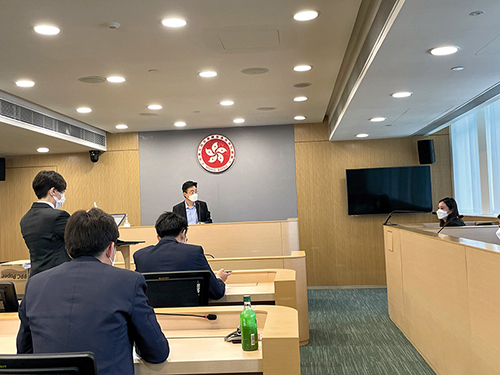
Trainees of the first MLEC Course undergo a moot court practice session to understand the professional ethics and procedures of providing expert testimony.
Liaison Bureau
The Liaison Bureau supports communication with stakeholders and strategic partners to fight crime and share intelligence on criminal activities. The Bureau co-ordinates meetings, including high-level exchanges with international strategic partners and working-level conversations, to meet cross-border investigative needs. It strives to maintain an effective partnership with Mainland, Macao and foreign law enforcement agencies. In terms of training, the Bureau works with Mainland authorities and INTERPOL to train members of the Force on the latest crime trends and police tactics.
Crime Prevention
The Crime Prevention Bureau raises public awareness of prevalent crimes through a multi-pronged approach. In 2022, it set up a Crime Alerts Network Database to spread anti-crime messages promptly on the WhatsApp Broadcast platform to external working partners and stakeholders as part of the Force's community engagement and commitment to fight deception, youth drug abuse, get-rich-quick scams, child abuse and technology crimes. The Bureau also dispensed more than 100 pieces of professional security advice to different sectors on crime prevention.

The Crime Support Group exchanged views on crime and security with management of the security industry at the Asia Securitex Conference.
To enhance officers' professionalism, the Bureau conducted a Standard Crime Prevention Course and crime prevention enhancement training, inviting external stakeholders from various professions for experience sharing and collaboration.
Forensic Support
The Identification Bureau provides services on professional fingerprint examination, firearms-related forensics, DNA collection and photography to the Force and other law enforcement agencies.
Criminal Records
The Criminal Records Bureau provides support 24 hours a day to frontline officers and other government departments in relation to information on the Police Operational Nominal Index Computer System. To enhance operational efficiency and internal processes, the Bureau is digitalising the workflow using technology.
Family Conflict and Sexual Violence Policy
The Family Conflict and Sexual Violence Policy Unit formulates and implements the Force's policies, procedures and training on how to handle child and elderly abuse, domestic and sexual violence, youth crime, and offences involving mentally incapacitated persons.
In October, the Unit launched another round of the 'Let's T.A.L.K' child protection campaign, themed 'Bystander Intervention'. It promoted closer partnership with stakeholders and highlighted the importance of early intervention in child abuse. Highlights included an improved one-stop application platform, a mobile tram exhibition, a debut social experiment focused on bystanders, and a badge design competition which drew more than 10,000 primary school students.
The campaign addressed community concerns effectively and led efforts to further child protection. It won the Gold Award of the Civil Service Outstanding Award Scheme 2022 – Excellence in Team Collaboration (Specialised Service) in December.
The Unit is constantly improving procedures for child abuse cases. In early 2022, it set up the Vulnerable Witness and Child Protection Task Force jointly with the Department of Justice and Social Welfare Department to expedite investigations, prosecutions and follow-up welfare.
In July, the Crime Wing established a voluntary Vulnerable Witness Support Cadre to enhance the Force's professional capability in dealing with the abuse of children and mentally incapacitated persons, and to strengthen co-operation with stakeholders in safeguarding vulnerable witnesses' welfare and dignity. More than 170 officers were recruited.
Major Incident Investigation and Disaster Support
The Major Incident Investigation and Disaster Support System helps police units and other government departments manage and analyse vast amounts of data during complex investigations. Officers continued to be deployed with other Disciplined Services to the Contact Tracing Office of the Centre for Health Protection in 2022 to trace close contacts of confirmed COVID-19 cases.
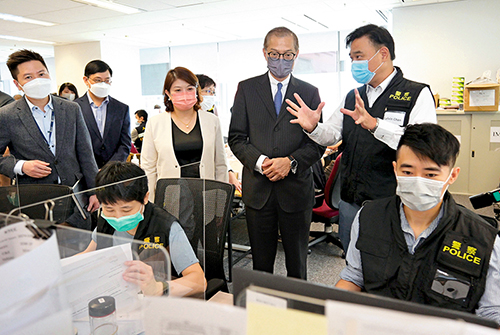
Police officers served at the Contact Tracing Office of the Centre for Health Protection to handle COVID-19 cases.
Witness Protection
The Witness Protection Unit conducts witness protection programmes. In addition, it provides victims and vulnerable persons who are susceptible to serious crimes with safety advice and the assurance of personal well-being.
Explosive Ordnance Disposal
The Explosive Ordnance Disposal Bureau carries out bomb disposal work. Apart from disposal operations on homemade improvised explosive devices, chemical precursors and conventional munitions, the Bureau safely disposed of a World War II British sea mine near Cape D'Aguilar in September.
Training at Police Tactical Unit Headquarters
In response to domestic terrorism threats in recent years, particularly before the HKSAR's 25th anniversary, the Police Tactical Unit (PTU) Headquarters had been reviewing and devising suitable tactics, and procuring new equipment and vehicles to better prepare officers for security operations, public order policing, major incidents and other emergencies.
Regular training and exercises are held with other government departments and external organisations to enhance frontline operational capabilities and to increase public awareness and confidence. The PTU Headquarters also reviews its training syllabus from time to time and incorporates scenario-based training, including the National Security Law and its application. Technology such as scenario-based interactive multiplayer simulation and small unmanned aircraft is deployed to further raise the capability and confidence of commanding officers to cope with the ever-demanding challenges.
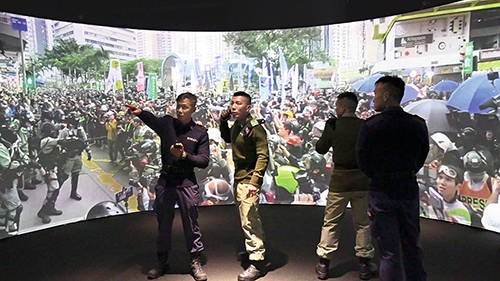
Police Tactical Unit officers participate in 360 Studio ImmerXe training on how to handle public disorder.
Special Duties
The Special Duties Unit is the definitive armed tactical intervention unit of the Force. The Unit is capable of conducting land, sea and air operations, and specialises in handling terrorist attacks, hostage taking and armed criminal activities.
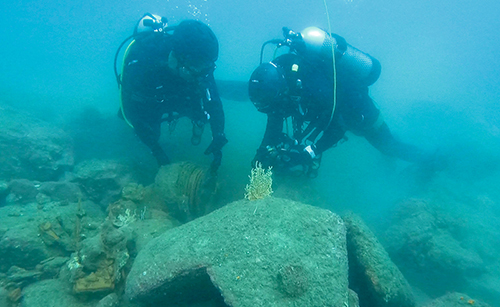
Special Duties Unit divers assisted the Explosive Ordnance Disposal Bureau in disposing of a naval mine in September.
Major Incidents
The Major Incidents Bureau oversees the Force's overall strategy and specific policies on the policing of terrorism and major incidents, and audits the Force's preparedness and response capabilities for such incidents. The Bureau comprises four divisions, namely the Counter Terrorism and Internal Security Division, Exercise and Audit Division, Major Events Planning Division and Police Public Engagement Office.
Counter-terrorism and Internal Security Policies
The Counter Terrorism and Internal Security Division formulates, implements and reviews the Force's policies and orders relating to counter-terrorism and internal security. The Division monitors global and domestic terrorism trends, refines counter-terrorism strategies in a timely manner, and formulates the corresponding action plans. It also works with other government departments and private organisations to raise public vigilance.
To ensure the highest standards of preparedness, the Division regularly co-ordinates and conducts counter-terrorism exercises across regions or the entire Force, involving other government departments and units, based on prevailing trends of terrorism. The Counter Terrorism Response Unit, which operates under the Division, is strategically deployed to protect critical infrastructure, sensitive premises and the railway system, and to ensure a rapid and effective response to any terrorist incidents necessitating immediate tactical intervention in Hong Kong.
Inter-departmental Counter-terrorism Collaboration
Anti-terrorism efforts call for not only law enforcement agencies to strengthen intelligence gathering capabilities, but also members of the public to play an important role. The Inter-departmental Counter Terrorism Unit encourages the public to provide information related to terrorism or violence and promotes the theme 'Spot and Report' by launching a CT Reporting Hotline, 63-666-999, in June. People who provide reliable terrorism-related information to police stand a chance of getting a reward.
Exercise and Audit
The Exercise and Audit Division is the Force's policy unit that steers and audits operational capabilities for the policing of public events and major incidents, and acts as the secretariat of the Command Cadre. The Division also reviews the policies and operational procedures of Emergency Units, co-ordinates the inter-departmental deployment of Special Constables, as well as explores and provides training and development opportunities for commanding officers.
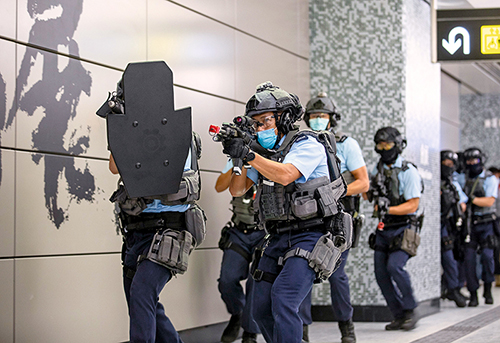
The Counter Terrorism Response Unit conducted a joint counter-terrorism exercise codenamed OCEANSHIELD with the Emergency Unit of Hong Kong Island and other police units on May 10 at Exhibition Centre MTR station.
Major Event Planning and Co-ordination
When the Force formulates operational plans for major events, the Major Events Planning Division performs a co-ordinating role to ensure effective communication among senior management, police formations, organisers and other stakeholders in the public and private sectors. Internally, it provides secretariat services to the Force Steering Committee and the Police Headquarters Planning and Coordination Team, and co-ordinates among major formations, advising and assisting in the planning and monitoring progress to ensure the operation plans are in line with the Force's directives. With concerted efforts, all celebratory events of the HKSAR's 25th anniversary were conducted in a safe, orderly and secure manner.
Public Engagement
To ensure the orderly and smooth running of public events, the Police Public Engagement Office strategically engages with stakeholders and event organisers to facilitate communication and enhance mutual understanding among all involved parties.
Operations Command and Control
The Operations Bureau oversees the Force's operational matters, liaises with the People's Liberation Army (PLA) Hong Kong Garrison, plans and executes search operations, and develops the future command and control communications system. The Bureau comprises the Operations Division, the PTU Operational Contingents, the Fourth Generation of Command and Control Communications System Special Duties Team, and the Key Points and Search Division, which includes the Police Dog Unit.
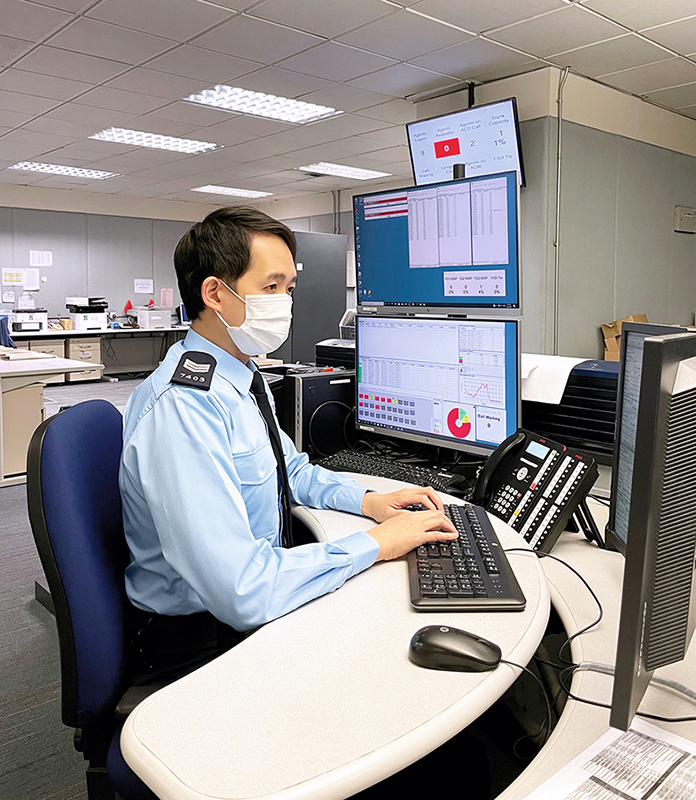
The Next Generation Command and Control System strengthens the Force's capability in responding to emergencies and enhances console efficiency in deploying police resources.
Operations Management and Liaison
The Operations Division runs the Headquarters Command and Control Centre round the clock and deals with operational matters including the formulation of relevant Force orders, policies concerning boundary security and illegal immigration, the allocation of operational resources and liaison with the PLA Hong Kong Garrison. It also oversees the policing policy of major cross-boundary infrastructure and city development projects.
Since the outbreak of COVID-19, the Division has been the Force's contact point with other government bureaux and departments. The Division plans and co-ordinates the enforcement of anti-pandemic measures and liaises with different departments regarding immigration control, quarantine arrangements and the co-ordination of restriction-testing declaration and compulsory testing notice operations.
Fourth Generation of Command and Control Communications
The Fourth Generation of Command and Control Communications System Special Duties Team plans, co-ordinates and prepares the development of the Force's command and control system. This involves enhancing the process of deploying police resources and replacing emergency telephone and radio systems. The mobile application Beat App allows frontline officers to use the Force's smartphones to check the records of individuals, vehicles and vessels. The application has successfully digitalised the traditional stop-and-search enquiry process, alleviating the tremendous workload at police consoles and shortening the waiting time of people being stopped for checks.
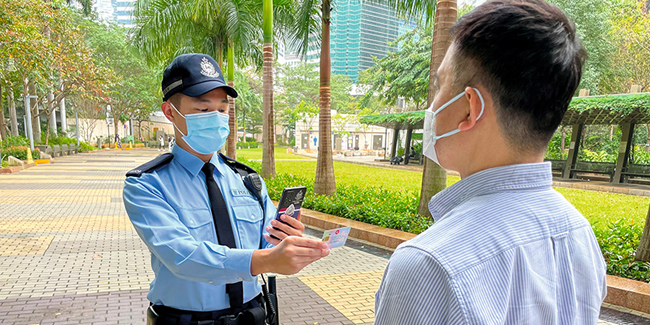
The Beat App greatly alleviates the workload of police consoles while shortening the waiting time of persons being stopped.
Critical Infrastructure Protection
The Critical Infrastructure Security Coordination Centre provides 24/7 support all round to stakeholders of critical infrastructure, and conducts security walkthroughs and assessments of such facilities. The aim is to improve the protection and resilience of critical infrastructure through public-private partnership and risk management, the application of security by design and recovery planning, and assistance in formulating security strategies and contingency responses. Participation in major security conferences and strengthened liaison with Mainland and overseas institutes are part and parcel of the Centre's capability building and international benchmarking.
Search Operations and Key Facility Protection
Two units come under the command of the Key Points and Search Division, namely the Force Search Unit and the Police Dog Unit.
The Force Search Unit formulates strategies and policies to protect crucial facilities, and ensures the Force is equipped with the latest drone technology to meet operational challenges. In 2022, the Unit carried out search and security screening to ensure the safe and orderly conduct of major events, including the security operation for the HKSAR's 25th anniversary.
The Police Dog Unit keeps more than 140 trained dogs for patrol, drug detection and the search of arms, ammunition and explosives. To enhance counter-terrorism readiness, the Police Dog Unit Quick Response Team deploys dog handlers and their police dogs strategically with other special units to boost patrols at critical infrastructure and sensitive premises, and to ensure a rapid and effective response to any potential terrorist activities.
High-level Command
The Command Cadre comprises a selected pool of highly trained Field Commanders from the ranks of Superintendent to Assistant Commissioner, who are capable of taking charge of significant operational command tasks. Members of the Cadre receive regular training in different fields to maintain their commanding capabilities at the highest level of readiness.
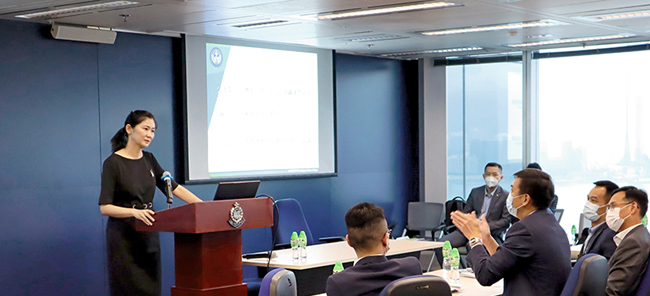
The Division Chief of the Police Liaison Department at the Liaison Office of the Central People's Government in the HKSAR, Ms Xu Yang, attended Command Cadre Quarterly Training Day in September by invitation and shared her experience and views with members of the Cadre on policing public events.
Professional Support in Scale Modelling
The Briefing Support Unit is an integral part of the Force's counter-terrorism response capabilities. It constructs scale models to support operational planning, post-incident investigations and court proceedings. The Unit consists of 28 officers who serve on a voluntary basis and have received formal training in interpreting plans and drawings, model building and 3D modelling.
Special Escort Duties
In 2022, the Force Escort Group recorded 2,442 man-days in 105 mobilisations to escort the PLA Hong Kong Garrison and Mainland medical trucks, and to transport arms and ammunition, valuable property, COVID-19 vaccines and prisoners requiring special security measures. During the HKSAR's 25th anniversary, the Group shouldered the major responsibility of securing the President's motorcade to and from a number of ceremonial, visitation and event venues.
Rope Access
Under the motto 'Attitude Drives Altitude', the Force Rope Access Cadre renders round-the-clock support to frontline units that have to execute policing tasks at unusual locations, and provides professional advice to frontline commanders related to working at height. Cadre members receive regular professional training and participate in overseas exchanges to maintain specialised access capabilities and the highest level of readiness.

The Force Rope Access Cadre helps frontline units execute duties under extremely difficult and dangerous environments, displaying the Force's professionalism.
Professional Negotiation
The Police Negotiation Cadre consists of 100 members who are on standby 24 hours a day as a secondary duty to their main policing functions. The Cadre is equipped with crisis intervention capabilities and can be deployed to handle terrorist and hostage incidents, to intervene in attempted suicides and to manage negotiations at major public events. All members share the common values of passion, nobility and commitment, to save lives and resolve crises.
The Cadre conducts regular negotiation training and joint exercises with key stakeholders within and outside the Force, and takes part in international conferences and training programmes. It organises crisis management and suicide intervention workshops for other disciplinary services, the Civil Service College, social workers, mental health professionals, school principals and educational psychologists.
TANGO Company
The TANGO Company consists of female officers only. It was initially formed in 1992 to deal with the repatriation of women and children in Vietnamese refugee camps. Nowadays, members are often deployed in public events and security operations to assist in security screening and crowd management.
Police Licensing Office
The Police Licensing Office issues licences and permits, processes the registration of societies, and reviews and implements licensing policies. It also facilitates the work of other licensing authorities and co-ordinates the Force's policy on public order events.
During the COVID-19 pandemic, the Office continued providing efficient public services. The Hong Kong Police Licensing System was enhanced, leading to the full launch of online application and e-payment services for eight types of licences and permits in July, including the Security Personnel Permit, Temporary Liquor Licence, Lion Dance Permit and Massage Establishments Licence. The Office aims to incorporate the iAM Smart function in the Licensing System by phases in 2023, and to fully digitise the licensing services by mid-2024 through a mobile application now being developed to issue electronic licences and permits.
The Office also helps frontline officers handle public order events by providing policy-related opinions to facilitate the lawful and peaceful conduct of such events.
Occupational Safety and Health
The Occupational Safety and Health (OSH) Cadre trains members of the Force on risk assessment, risk management and OSH incident investigation. Its goal is to achieve compliance with the Occupational Safety and Health Ordinance across the Force. In 2022, the Cadre provided training that led to OSH qualifications for 208 people, and gave safety induction training to more than 960 new recruits at the Police College. The Cadre also arranged refresher training for more than 830 members of the Force.
Animal Watchers Programme
To combat crimes against animals, the Police implement the Animal Watchers Programme (AWP) proactively to pool together the efforts of animal lovers at the community level and raise awareness of preventing cruelty to animals.
In 2022, a series of educational and promotional activities named AWP x 25A were held to celebrate the HKSAR's 25th anniversary. Events included the 'AWP Colours in 25A' colouring and drawing contest, promotion of an Animal Care Corner in schools and the Bring Your Own Pet Treasure Hunt in Ocean Park. The treasure hunt drew nearly 1,000 participants who brought along more than 200 pet dogs to learn how to care for animals by overcoming various challenges. They also set a world record for the 'Most Pet Owners Hugging Their Dogs at the Same Time'.
Public Relations
The Police Public Relations Branch was officially upgraded to become the Public Relations Wing (PR Wing) under the A Department on July 15. The establishment of the PR Wing fully demonstrates the importance attached by the Force to public relations. It also highlights the Force's strategic direction and determination to work with the community in promoting police policies together.
During the year, the Good Citizen Award (GCA) Scheme continued to be revamped. The GCA Presentation Ceremony 2021 (Phase II) was a celebratory event of the HKSAR's 25th anniversary and took place at the Hong Kong Convention and Exhibition Centre in August under the themes of inheritance and child protection, to symbolise the passing of the Good Citizen spirit to the younger generation. Apart from the ceremony, exhibitions were held at shopping centres to publicise the GCA and encourage positive values.
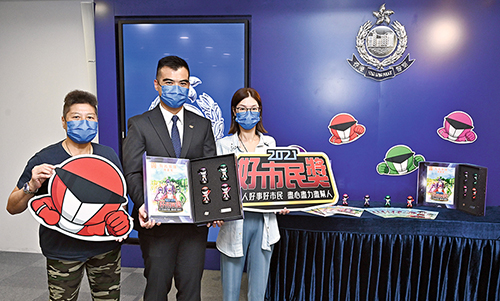
The PR Wing together with two Good Citizen Award awardees introduced a new comic book with true stories of 10 awardees and four cartoon superheroes presented in different colours to represent the alertness, activeness, wisdom and calmness of the new concept, Good Citizen Alliance.
To enhance operational efficiency of the Force, the PR Wing recruited 64 new members to the Force Media Liaison Cadre and at the same time reduced the cadre size from 310 to 240. The PR Wing also organised training for more than 6,000 officers that included sharing sessions on media facilitation and an e-learning package compiled for the 25th anniversary of the HKSAR. In addition, the Cadre initiated 24/7 media facilitation support so that frontline officers could focus on their operational duties.
In July, the PR Wing worked with a television station to produce the inaugural series, 'The Little Grape x HandsUp' and 'The Little Grape Animation', featuring the Force's adorable mascot The Little Grape to explain the modus operandi of common scams to children by way of story-telling and help them form a habit of guarding against deception from young. Buoyed by its popularity, the animation series was converted into The Little Grape Animation Picture Book and distributed to more than 500 primary schools. The PR Wing also liaised with the Hong Kong Public Libraries to include the picture book in their collections.

The PR Wing distributed The Little Grape Animation Picture Book series to over 500 primary schools via Police Community Relations Offices.
In other areas of multimedia work, the PR Wing collaborated with broadcast, radio and print media to produce programmes and publish more than 100 features covering the HKSAR's 25th anniversary, anti-epidemic measures, crime prevention and policing.
The PR Wing is making good use of the fortnightly magazine OffBeat, which has been revamped from an online staff newsletter, as a public engagement tool to reach out to the media and the public. Three issues of the OffBeat Special Edition featuring specific themes were published in 2022.
In conjunction with the HKSAR's 25th anniversary (25A), a documentary video, '25A Documentary of Hong Kong Police Force – United We Stand to Guard Our City', was produced and broadcast on TV to illustrate the professionalism of the Force in its indefatigable protection of the city and provision of quality services with honour, duty and loyalty before and after the handover of Hong Kong in 1997.
On September 29, the Force unveiled its first large LED billboard outside Mong Kok Police Station. The screen faces Nathan Road and is right beside one of the exits of Prince Edward MTR station. Its advantageous location helps the Force deliver important messages on national security, vigilance to deception, recruitment and counter-terrorism round the clock, for the public to gain a better understanding of police work.
'OffBeat On Air' is a live broadcast programme produced by the PR Wing for airing on the Force's Facebook page and YouTube channel at 9pm every Thursday. The programme has accumulated more than 120 episodes since its launch in 2020. Starting from November 2022, it has also been rerun on RTHK channel 31 at 6.30pm every Monday. In addition, social media Phoenix Show shares the program every Friday, while HOY TV and Cable TV screen an anti-scam video of one minute from each episode to highlight the latest crime trends and prevention tips.
Connecting with the Community
The PR Wing nurtures young people through the Junior Police Call (JPC) Scheme to become upright youth leaders and crime-fighting partners. In line with the new strategy IDEAS@JPC, a JPC Award Scheme was launched for JPC members to participate in activities under the five core areas of 'Innovation', 'Discipline', 'Exposure', 'Adventure' and 'Synergy' in order to achieve more systematic, holistic and balanced development. The PR Wing also organised the first JPC Chinese flag-raising competition and other activities on national affairs, such as sharing sessions about books or films and visits to the Hong Kong Palace Museum, to strengthen young people's awareness of national affairs and sense of national identity. During the peak of COVID-19 at the start of the year, JPC members distributed anti-epidemic supplies, facing adversity alongside residents and serving the community. To better define the JPC image, the PR Wing designed and launched a new JPC uniform that was suitable for the wide range of training.
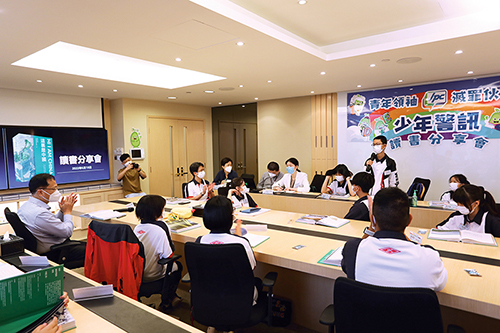
A JPC member gave his thoughts on a publication about Chinese geography and culture in a book-sharing session.
In support of the Government's fight against COVID-19, the Force provided JPC@Pat Heung for use as a quarantine facility between March 2020 and May 2022. It was returned to the Force on May 27 and resumed youth training in June, introducing a new programme that taught participants about Chinese foot drills and flag raising to strengthen their national identity. In November, JPC@Pat Heung rolled out Code Busters, Hong Kong's first and only physically created escape-room game based on Hong Kong police stories. Participants can learn about Internet information security and how to protect their personal details, be alert to deception, and resist drugs and school bullying. Various stakeholders, such as the Law Society of Hong Kong and the Hong Kong Federation of Youth Groups, were enlisted to help JPC@Pat Heung engage with young people, provide leadership and adventure training, and enhance their understanding of social issues and the law.
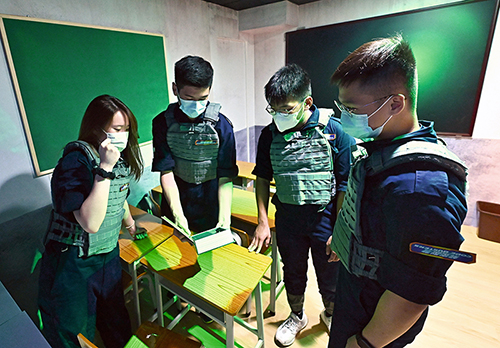
Code Busters, Hong Kong's first and only physically created escape-room game based on Hong Kong police stories, was rolled out at JPC@Pat Heung in November.
The JPC holds annual reciprocal visits with Singapore's National Police Cadet Corps to broaden the horizons of young people in Hong Kong and Singapore. In view of COVID-19, the exchange programme took place virtually for the first time in JPC@Pat Heung on October 29.
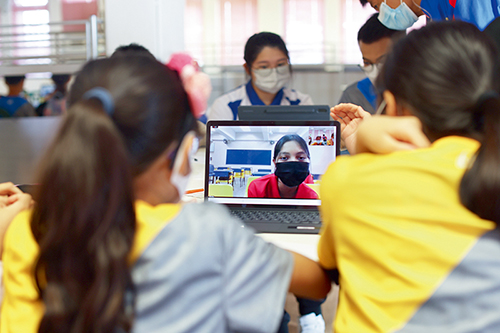
Students from 37 schools joined the first virtual exchange programme for members of the JPC and Singapore National Police Cadet Corps to foster communication among youngsters in the two places and widen their horizons.
The Commissioner of Police meets the chairpersons of the 18 districts' associations of school heads and Federations of Parent-Teacher Associations every half a year to discuss and exchange views about police work and youth issues, especially on strengthening youngsters' awareness of law abidance and their community engagement. On July 19, the Force held its first exchange session with more than 50 representatives of 20 school sponsoring bodies to enhance collaboration and to prevent youths from going astray or becoming victims in criminal cases. The Force Working Group on Community Engagement adopts cross-sectoral and multidisciplinary initiatives to help teenagers. The Force is also rebuilding its relationship with youngsters using a soft approach, communicating with them through sports and music, and releasing films on social media to strengthen their awareness of preventing and fighting crime.
To prevent youth-related crimes and provide coping strategies, the PR Wing co-published 40,000 copies of a Youth Crime Prevention Booklet with the Education Bureau and school organisations. The booklet was distributed to more than 1,000 primary and secondary schools and educational institutions. The PR Wing also collaborated with its working partners to produce a series of short videos on youth crime prevention that explained in a down-to-earth way the serious consequences of breaking the law.
The Senior Police Call (SPC) Scheme has more than 14,600 members across 22 police districts. Various activities and training sessions, such as the 'SPC Anti-deception and Health Campaign', are organised jointly with multidisciplinary groups. Under the motto, 'SPC Spirit of Helping Oneself and Others', the Scheme serves as a platform to communicate with the elderly, develop a fight-crime partnership with them, advocate personal safety and road safety awareness, and encourage elderly residents to join activities.
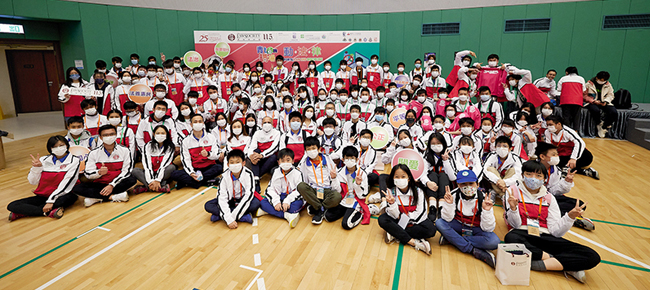
The Sports · Law · Discipline – Sports and Music Carnival organised by the Law Society of Hong Kong took place at the Police Sports and Recreation Club on December 10 under the full support of the Force.
Road Safety
In 2022, the number of accidents involving fatalities and serious injuries decreased by 783 cases to 1,135, down 41%. The number of fatal traffic accidents declined by five cases to 89 (down 5%), the lowest since 1954. The Police will continue to work with the community to support the vision, 'Zero Accidents on the Road, Hong Kong's Goal'.
Frontline Auxiliary Support
The Hong Kong Auxiliary Police Force is a well-trained reserve team that supports frontline policing duties of the regular force. It maintains an establishment of 4,501 members. In the financial year 2021-2022, a total of 331 new recruits were taken on strength, the most in the last 20 years. To meet operational needs, an average of 700 members were deployed per day.
On August 20, the Auxiliary Police Force conducted its first passing-out parade featuring the Chinese-style foot drill at the Auxiliary Headquarters. The passing-out squads performed impeccable marching movements with precision, displaying a great sense of patriotism and strengthening national identity.
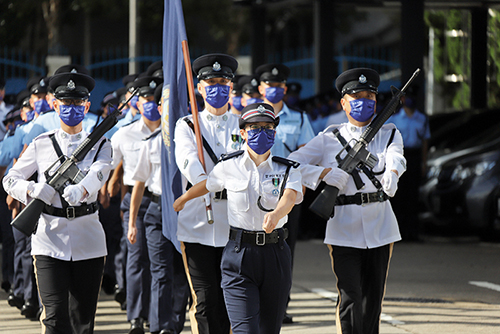
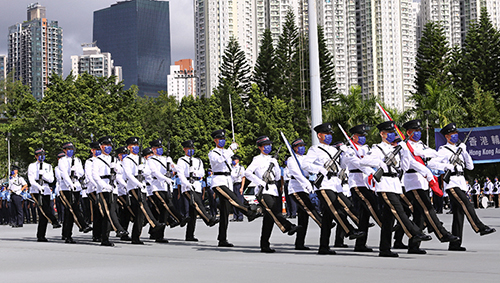
The Auxiliary Police Force on August 20 conducted its first passing-out parade featuring the Chinese-style foot drill at the Auxiliary Headquarters.

